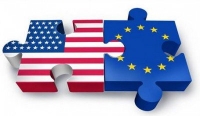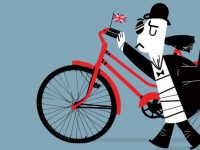European Union: Britain will decide on its next in Europe with a referendum once negotiations with the EU
2015/11/20

In or out? Britain will decide on its next in Europe with a referendum once negotiations with the EU have been concluded. A delegation from the Parliament’s constitutional affairs committee went to London on 16 and 17 November to discuss the upcoming EU membership referendum with ministers, parliamentary committees and think-tanks. We spoke to committee chair Danuta Hübner, a Polish member of the EPP group, about her findings and the upcoming negotiations.
Q: What impressions did you get from the visit to London?
D.H.: The price of this visit lies in the fact that we spoke to all layers of public authority, inclunding people representing political parties.
It’s not about the issues that are on the schedule for negotiations. The problem lies much deeper. I think that the British are really seeking their identity today. They want to identify themselves in the context of Europe.
The major message we got from the no camp was that the results of the negotiations do not matter. Whatever the results will be, they are against. From Labour we have heard that no matter what the result will be, they will vote to remain . That as well shows how divisive the issue is and how divided society.
My problem is to what extent the results of the negotiations will matter in the referendum. This is significant for us, because making concessions is a process which as well has its cost. However, we have a long history of negotiations and we usually find a solution, so I think we will find solutions here.
Q: According to the polls the referendum will be very close. What factors do you think will decide it?
D.H.: The large unknown, which may influence as well the referendum and make it very tight, is the current security situation in Europe and the world. It was clear from the discussions that security will be the number one issue and the economy less so. They are very critical about the way we handle the migration and refugee crisis. We were surprised that they see Europe as a negative factor. We know very well with security, with terrorism and the refugee crisis we will not make it individually, but even together unless we show solidarity, it will not be solved.
Q: What role should the European Parliament play in the upcoming negotiations?
D.H.: The Parliament is legally fully involved in the process. Its major role is at the end for the endorsement of the outcome. It cannot happen without Parliament.
We want them to remain . We made it clear that nobody is going to win with the UK leaving the European Union. That’s why our message was strong. We want you to remain with us, but it is up to you to decide. But think long term and think about the world around and isn’t it better to be in a bigger Europe. Europe even with the UK is a small continent.
- Related Articles

Climate change laws around the world
2017/05/14 There has been a 20-fold increase in the number of global climate change laws since 1997, according to the most comprehensive database of relevant policy and legislation. The database, produced by the Grantham Research Institute on Climate Change and the Environment and the Sabin Center on Climate Change Law, includes more than 1,200 relevant policies across 164 countries, which account for 95% of global greenhouse gas emissions.
Brexit negotiations should treat energy as ‘special case’
2017/05/14 There are strong practical reasons why the UK and EU should treat energy as a appropriate case during Brexit negotiations, argues a new statement. The statement, jointly authored by Chatham Home, the University of Exeter and the UK Energy Research Centre (UKERC), says finding common ground on energy during the Brexit negotiations would benefit both the UK and remaining EU27, while compromise may be relatively easier to achieve than for other areas.
You’ll Only Understand Trump and Brexit If You Understand the Failure of Globalization
2016/11/23 Trump Trump made rejection of globalization a centerpiece of his campaign. In his July 21st acceptance speech as the Republican nominee, he said:
Towards NAFTA-EU Economic Integration?
2016/11/23 The ratification of the CETA agreement is imminent, with far-reaching economic and social implications. France’s Prime Minister Manuel Valls is currently in Canada for meetings with Prime Minister Justin Trudeau. CETA is the object of protests in both Canada and the EU. It was also the object of a legal procedure in Germany. The logic of the agreement must be understood. It constitutes the first step towards the integration of NAFTA and the EU. This integration would create an North Atlantic political entity broadly coinciding with NATO.
If Prime Minister May is serious in her pledge that ‘Brexit means Brexit’, she needs to be sensitive to the risk that taking too long to start the formal process will anger the 27 spurned countries
2016/08/25 It’s been two months since Britain voted to quit the European Union (EU). Since again, the silence on how the divorce proceedings will be conducted has been deafening. It’s an impasse that helps neither side and, once Europe’s August holiday season is over and the region’s politicians are back at their desks, there’s a risk that things could turn nasty.
- European Union News
-
- AFGHANISTAN: UNWTO: International tourism – strongest half-year results since 2010
- ALBANIA: US LNG exports make European market more competitive
- AZERBAIJAN: Azerbaijan, EU set to continue talks on common aviation area deal
- EUROPEAN UNION: UK seeks to 'align' with EU on data protection rules
- EUROPEAN UNION: ECB Rate-setters Raise Concern Over Euro Strength
- EUROPEAN UNION: Eurozone Construction Output Falls For Second Month
- Trending Articles
-
- SIERRA LEONE: Where’s best to invest in Sierra Leone?
- CHINA: China Invites 5 Countries As Guests For BRICS Summit
- EGYPT: Dollar exchange rate maintains stability at Egypt's banks
- NIGERIA: Africa's Richest Man Sets Sights on Launching Nigeria University
- INDIA: Uztrade JSC creates Trading House in Delhi
- BOTSWANA: Africa: U.S. State Department To Get Experienced Diplomat in Key Africa Post












